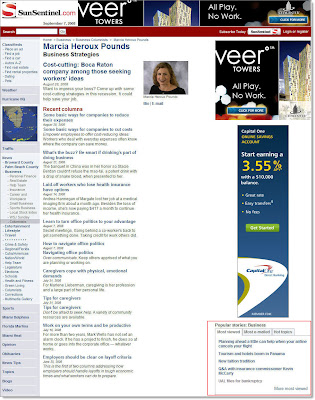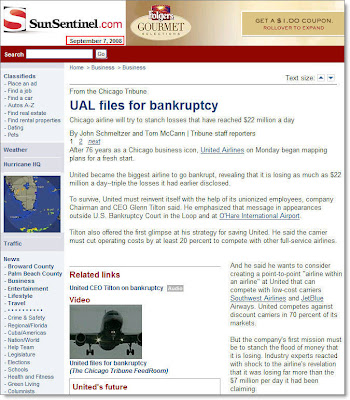Why did United Airlines (UAUA) stock suddenly plunge from $12 to $3 the other day? Because everyone on Wall Street thought the company had filed for bankruptcy. Why did everyone on Wall Street think the company had filed for bankruptcy? Because:
- The airline industry is reeling from $100+ oil, and airlines like United file for bankruptcy at the drop of a hat
- A news summary on Bloomberg (incorrectly) said the company had filed for bankruptcy.
We knew that much the other day. And now we know the full story.
- At 1AM last Sunday morning, a 2002 article with the headline "UAL Files For Bankruptcy" suddenly appeared in the "Most Popular" section of the web site of the Tribune-owned Florida newspaper Sun-Sentinel. Why did this happen? Tribune doesn't explain precisely. Because it happened at 1AM, however, it seems reasonable to assume that traffic to other stories on the site was very light, meaning that it didn't take much to make the story popular.
- Googlebot found the article and made it searchable within Google News.
- A non-detail-oriented securities analyst summarized the article (apparently without reading it first) and uploaded the summary to Bloomberg.
By Monday morning, UAL stock had plunged to $3 a share.
Tribune insists that the text of the article made it clear that the bankruptcy filing took place in 2002--and therefore denies responsibility. Google News, run by an algorithm that doesn't understand English, presumably also denies responsibility. The Sun-Sentinel "Most Popular" widget presumably denies responsibility. Which leaves the securities analyst, who, we gather, made a mistake. (But we do imagine the SEC will be taking a peek into his and his relatives and friends bank accounts to see whether they have suddenly come into some unexplained cash).
Google, interestingly, says the story did not appear on the Google News headline pages but was merely available to those searching Google News. It also points out that the story did not have any sort of dateline, that a date on the PAGE itself (not within the story) said September 7, 2008, and that it removed the article as soon as it was notified that it "had been posted in error." (Implication: by the Sun Sentinel). Google also helpfully includes a snapshot of the first part of the article (see below), which does NOT make it clear that it is from 2002.
OUR VERDICT
Google's Liability: None. Based on the detailed evidence Google has provided (see images and chronology below), we believe it is blameless. The only date on the page that we can see is the current date, and the first several paragraphs of the story do NOT make it clear that the article is from 2002.
Tribune's Liability: At least partial, possibly full. The article should have had a dateline. We challenge Tribune management to look at the screenshot Google provided and say with a straight face that a general-interest reader should have known that it was from 2002.
Securities Analyst's Liability: Probably partial, possibly none. We assume that the article eventually makes it clear that the article was from 2002 (again, though, this doesn't seem to be evident in the excerpt). If so, the analyst should have been more careful.
Google's findings and Tribune's findings below:
Since our last post, some have asked why Google News didn't recognize that an old story relating to United Airlines' 2002 bankruptcy was outdated. We thought that a brief chronology would be helpful.
On Saturday, September 6th at 10:36 PM Pacific Daylight Time (or Sunday, September 7th at 1:36 AM Eastern Daylight Time), the Google crawler detected a new link on the Florida Sun-Sentinel's website in a section of the most viewed stories labeled "Popular Stories: Business." The link had newly appeared in that section since the last time Google News' Googlebot webcrawler had visited the page (nineteen minutes earlier), so the crawler followed the link and found an article titled "UAL Files for Bankruptcy." The article failed to include a standard newspaper article dateline, but the Sun-Sentinel page had a fresh date above the article on the top of the page of "September 7, 2008" (Eastern).
Because the Sun-Sentinel included a link to the story in its "Popular Stories" section, and provided a date on the article page of September 7, 2008, the Google News algorithm indexed it as a new story. We removed this story as soon as we were notified that it was posted in error.
While we don't know why the Sun-Sentinel's website included the link in its "Popular Stories" section, our timestamps show that Google News first crawled the UAL story after following the link from the Sun-Sentinel's "Popular Stories" box:
- At 10:17:35 PM/PDT, our crawler retrieved a copy of the Sun-Sentinel business section page.
As you can see, no UAL story appears at this time. - At 10:36:38 PM/PDT, our crawler retrieved an updated copy of the same section. This updated version included a new link in the "Popular Stories: Business" section to a story titled "UAL Files for Bankruptcy."

- At 10:36:57 PM/PDT, our crawler followed the new link and fetched this copy of the UAL story.

At that point, our index was updated to include the article with the date that the story was crawled, and the story became searchable on Google News. - At 10:39:57 PM/PDT, the Sun-Sentinel received its first referral to the UAL story from Google News, with a user clicking on a Google News link to the Sun-Sentinel's UAL story.
The Tribune Co. (owner of the Sun-Sentinel) has confirmed in its September 9, 2008 press release that the first referral from Google News to the article came after the UAL story appeared in the "Popular Stories" section.
We hope that this sheds some light on the situation from our perspective.
On February 28, Axel Springer, Business Insider's parent company, joined 31 other media groups and filed a $2.3 billion suit against Google in Dutch court, alleging losses suffered due to the company's advertising practices.

